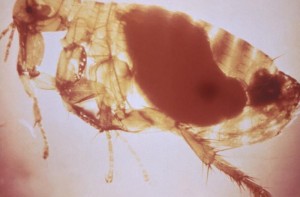A plague warning has been issued in Boulder, Colorado last week after fleas collected in open space near the 7200 block of Terrace Place in Boulder, northeast of Cherryvale and South Boulder Roads, tested positive for plague. This is the first time plague activity has been confirmed in Boulder County this season, county officials note.

Flea samples were taken at that location after Boulder County Public Health was notified by a neighbor who noticed prairie dogs had died off on their property.
The neighborhood area has been posted with signs listing precautionary measures to avoid plague, and notices have been sent to local parks and open space partners, as well as animal control officers.
“Because plague is most commonly transmitted by fleas, taking steps to avoid flea exposures will help prevent the spread of the disease,” said Lane Drager, Boulder County Public Health Consumer Protection Program coordinator.
Public health officials recommend the following precautions to reduce the likelihood of exposure to plague:
- AVOID FLEAS! Protect pets with flea powder, drops, or a new flea collar. Keep pets on a leash and out of wild rodent habitats.
- STAY OUT of areas that wild rodents inhabit. If you enter areas with wild rodents, wear insect repellent and tuck pants cuffs into socks to prevent flea bites.
- AVOID all contact with wild rodents, including squirrels; do not feed or handle them.
- DO NOT TOUCH sick or dead animals.
- PREVENT rodent infestations around your house. Clear plants and materials away from outside walls, reduce access to food items, and set rodent traps.
- TREAT known rodent sites around your home with flea powder or a suitable insecticide.
Household pets, such as dogs and especially cats, can get plague themselves or carry infected fleas home to their owners. In rare instances, plague can be transmitted to people from cats sick with plague.
“Keeping cats indoors is the best way to protect them from getting plague,” said Drager. “Pet owners should also discuss with their veterinarians the best way to protect pets from fleas.”
Related: Colorado health officials warn of plague positive fleas in La Plata County prairie dog burrow
Plague occurs naturally in Colorado and is an infectious disease spread by fleas to wild rodents and other small mammals, such as, squirrels, rats, prairie dogs, and rabbits. Bubonic plague is the most common form of plague and occurs after a bite from an infected flea. Plague can spread to humans when infected fleas from squirrels, prairie dogs, and other wild rodents bite a human.
Symptoms of plague include high fever, extreme fatigue, and painful swollen lymph nodes (called bubos). Anyone observing these symptoms in a person or pet should contact their health care provider or veterinarian immediately. Plague can be treated with antibiotics, but the treatment is most successful when the disease can be diagnosed quickly. For more infectious disease news and information, visit and “like” the Infectious Disease News Facebook page
Colorado has reported five cases of human plague so far in 2014.


One thought on “Plague warning in Boulder, Colorado”